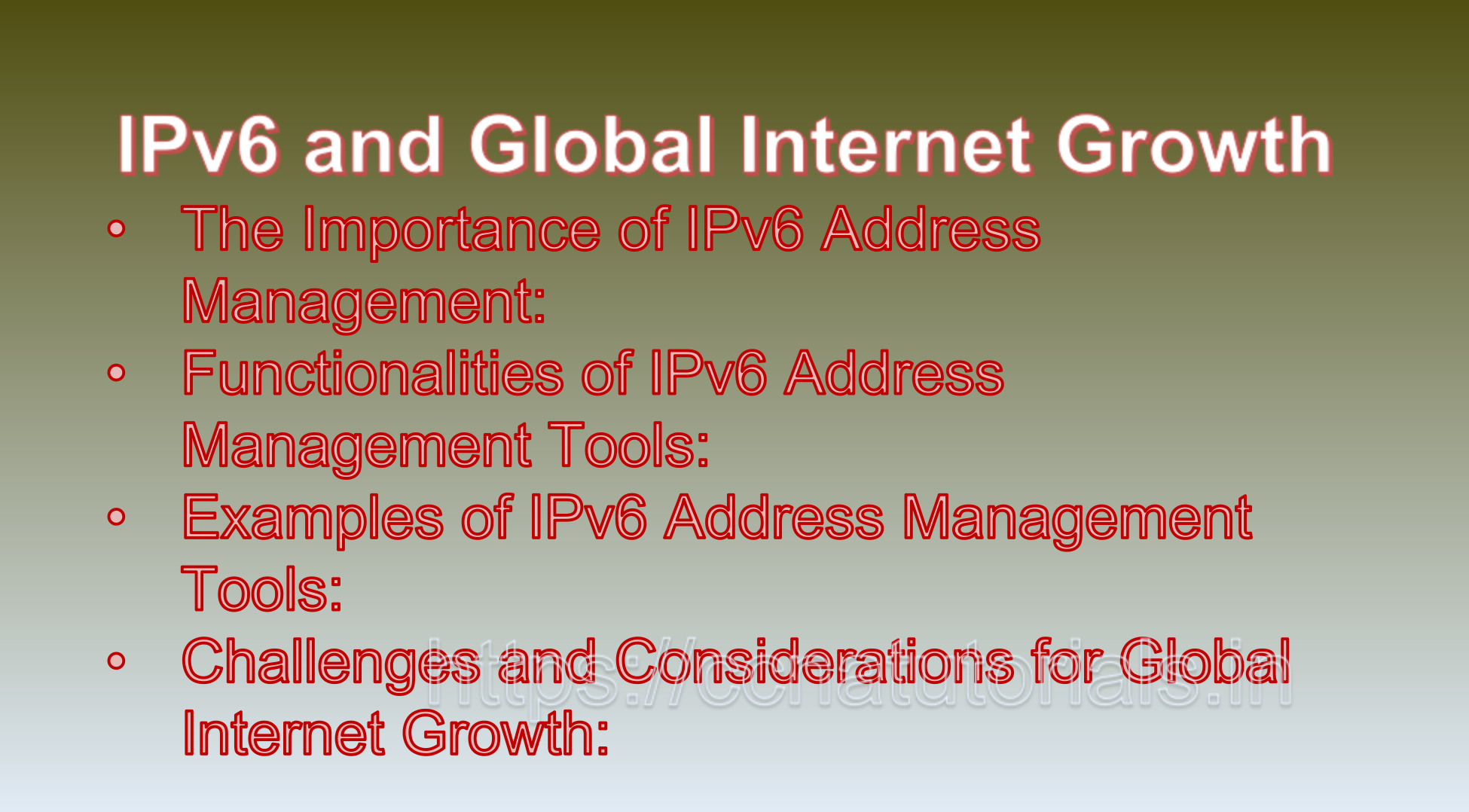Contents of this article
In this article, I describe IPv6 Address Management Tools, Simplifying Network Administration and Planning. Internet Protocol version 6 (IPv6) brings a larger address space and improved features compared to its predecessor, IPv4. With the proliferation of internet-connected devices, efficient IPv6 address management becomes crucial. IPv6 address management tools assist network administrators in effectively allocating, tracking, and maintaining IPv6 addresses. This article explores the significance of IPv6 address management tools, their functionalities, and examples of how they simplify network administration and planning.
1. The Importance of IPv6 Address Management:
IPv6’s extensive address space introduces new challenges and opportunities for address allocation and management. Efficient address management is vital to avoid address exhaustion, reduce operational complexities, and enhance network security. IPv6 address management tools streamline these processes, allowing organizations to harness the benefits of IPv6 effectively.
2. Functionalities of IPv6 Address Management Tools:
– Address Assignment:
IPv6 address management tools automate the assignment of IPv6 addresses to devices. They ensure that each device receives a unique address without manual intervention, reducing the risk of address conflicts.
– Address Tracking:
These tools help administrators monitor the utilization of IPv6 addresses in real-time. This tracking facilitates resource optimization and prevents overallocation or underutilization of addresses.
– Subnet Allocation:
IPv6 address management tools aid in subnetting by helping administrators divide the IPv6 address space into smaller, manageable subnets. This supports efficient network segmentation and resource allocation.
– Centralized Control:
These tools provide a centralized interface for administrators to manage and configure IPv6 addresses across the entire network, simplifying administration and reducing errors.
– Reporting and Auditing:
IPv6 address management tools generate reports and logs that offer insights into address utilization, allocation trends, and potential issues. This data assists administrators in making informed decisions.
3. Examples of IPv6 Address Management Tools:
– BlueCat Address Manager:
BlueCat Address Manager is a comprehensive IPv6 address management solution. It offers features like automated IPv6 address assignment, dynamic DNS updates, and subnet optimization. The tool provides a user-friendly interface for administrators to manage IPv6 addresses efficiently.
– Infoblox IPAM:
Infoblox IPAM (IP Address Management) is designed to simplify IPv6 address allocation and tracking. It offers features such as automated address assignment, DNS integration, and reporting tools. Infoblox IPAM helps organizations maintain accurate IPv6 address records.
– SolarWinds IP Address Manager:
SolarWinds IP Address Manager is another example of an IPv6 address management tool. It allows administrators to plan, allocate, and monitor IPv6 addresses, ensuring efficient utilization and reducing address conflicts.
4. IPv6 Address Planning:
IPv6 address planning involves designing a structured allocation strategy to efficiently distribute IPv6 addresses within an organization’s network. Address planning ensures that addresses are allocated based on usage requirements, network topology, and future scalability needs. IPv6 address management tool play a pivotal role in executing effective address planning strategies.
5. IPv6 Address Management in Large Organizations:
For large organizations with complex network infrastructures, IPv6 address management becomes even more critical. These organizations often have multiple subnets, distributed locations, and a considerable number of devices. IPv6 address management tool help maintain control and organization in such environments:
– Higher Education Institutions:
Universities and research institutions manage extensive networks with numerous devices. IPv6 address management tool enable efficient allocation for various departments, research projects, and campus locations.
– Enterprise Networks:
Large corporations with multiple offices and branches benefit from IPv6 address management tool to ensure that addresses are allocated logically, facilitating efficient communication and resource utilization.
6. IPv6 Address Management Challenges:
While IPv6 address management tool offer substantial benefits, there are challenges to consider:
– Complexity:
The larger address space and hierarchical addressing of IPv6 can lead to increased complexity when designing allocation plans. IPv6 address management tool help address this complexity but require careful configuration.
– Integration:
Integrating IPv6 address management tool with existing network management systems and DNS infrastructure can be a challenge. Ensuring seamless integration is essential for effective operation.
– Education and Training:
Network administrators need to be trained in using IPv6 address management tool effectively. Adequate training is crucial to prevent misconfiguration and ensure accurate address allocation.

In short IPv6 Address Management Tools, Streamlining IPv6 Address Management:
IPv6 address management tools are indispensable in the modern networking landscape. They empower organizations to efficiently allocate, track, and manage IPv6 addresses, supporting network scalability and optimizing resource utilization. From simplifying administration tasks to facilitating efficient address planning, these tools play a pivotal role in realizing the benefits of IPv6. As the internet continues to evolve and the number of connected devices grows, IPv6 address management tools will remain a crucial component of network management strategies, ensuring connectivity, security, and operational efficiency.
IPv6 Address Management Tools: Facilitating Efficient Network Administration
Internet Protocol version 6 (IPv6) has gained prominence as the solution to the address exhaustion challenges of its predecessor, IPv4. As organizations adopt IPv6 to accommodate the growing number of devices and services in their networks, the need for effective address management becomes critical. IPv6 address management tools play a pivotal role in simplifying the allocation, tracking, and administration of IPv6 addresses. This article delves into the significance of IPv6 address management tools and provides examples of how these tools enhance network administration efficiency.
1. The Need for IPv6 Address Management:
IPv6’s significantly larger address space introduces complexities that require advanced tools for address assignment, tracking, and optimization. Manual management of IPv6 addresses becomes impractical due to the sheer volume of available addresses. IPv6 address management tools are designed to streamline the management process, ensuring efficient utilization and simplifying network administration.
2. Key Features of IPv6 Address Management Tools:
– Address Assignment:
These tools facilitate the automated allocation of IPv6 addresses to devices, reducing the risk of errors and ensuring consistent addressing across the network.
– Tracking and Inventory:
IPv6 address management tools track address utilization, enabling administrators to identify available addresses and prevent conflicts or wastage.
– DHCPv6 Management:
Dynamic Host Configuration Protocol for IPv6 (DHCPv6) allows devices to request IPv6 addresses from a central server. Address management tools can streamline DHCPv6 configuration and monitoring.
– Subnetting and Hierarchical Addressing:
IPv6 address management tools assist in planning and implementing hierarchical addressing schemes, optimizing address space utilization and network routing.
3. IPv6 Address Management Tool Examples:
– Infoblox:
Infoblox is a widely recognized provider of network infrastructure automation solutions. Their IPv6 address management tool offer features such as automated address assignment, DHCPv6 management, and detailed reporting on address utilization. Infoblox’s tools enable organizations to efficiently manage large-scale IPv6 deployments and maintain accurate records of their network resources.
– BlueCat Networks:
BlueCat Networks provides IPv6 address management solutions that focus on DNS, DHCP, and IP Address Management (DDI). Their tools help organizations automate the allocation, tracking, and management of IPv6 addresses, ensuring reliable connectivity and efficient resource utilization.
– EfficientIP SOLIDserver:
The SOLIDserver platform by EfficientIP offers advanced IPv6 address management capabilities. It supports IPv6 autoconfiguration, DHCPv6 management, and subnet optimization. The tool assists in maintaining accurate IPv6 address records and simplifying the administration of complex networks.
4. Benefits of IPv6 Address Management Tools:
– Efficiency:
IPv6 address management tools automate repetitive tasks, reducing the likelihood of errors and enabling administrators to focus on strategic network management.
– Optimized Address Space Utilization:
These tools assist in allocating and tracking addresses, preventing address wastage and ensuring efficient utilization of the vast IPv6 address pool.
– Centralized Control:
IPv6 address management toolprovide a centralized platform for monitoring and managing IPv6 addresses across the entire network, regardless of its size or complexity.
– Reduced Downtime:
Accurate address tracking and management help prevent address conflicts, reducing the risk of network downtime and disruptions.
– Scalability:
IPv6 address management tool are designed to handle large-scale deployments, making them suitable for organizations with extensive networks and a high number of devices.
5. Case Study: University Network IPv6 Deployment:
A university decides to transition to IPv6 to accommodate the growing number of devices on its campus network. The IT team deploys an IPv6 address management tool to facilitate the migration process and ongoing administration.
Implementation:
– The tool assists in planning and implementing a hierarchical addressing scheme, ensuring efficient utilization of the university’s IPv6 address space.
– Automated address assignment and DHCPv6 management streamline the provisioning of IPv6 addresses to devices.
Benefits:
– The university experiences simplified network administration due to accurate address tracking and centralized control.
– Address conflicts and downtime are minimized, enhancing the user experience for students, faculty, and staff.
– The scalability of the IPv6 address management tool ensures that the university’s network can accommodate future growth.
Conclusion for IPv6 Address Management Tools, Simplifying IPv6 Network Management:
As organizations embrace IPv6 to support the proliferation of internet-connected devices, efficient address management becomes paramount. IPv6 address management tool offer a comprehensive solution for automating the allocation, tracking, and administration of IPv6 addresses. These tools not only enhance efficiency and accuracy but also contribute to optimized address space utilization and reduced network downtime. Examples such as Infoblox, BlueCat Networks, and EfficientIP SOLIDserver showcase the capabilities of IPv6 address management tool in real-world network environments. By leveraging these tools, organizations can confidently navigate the challenges of IPv6 deployment and ensure that their networks are well-equipped to handle the demands of the digital era.






